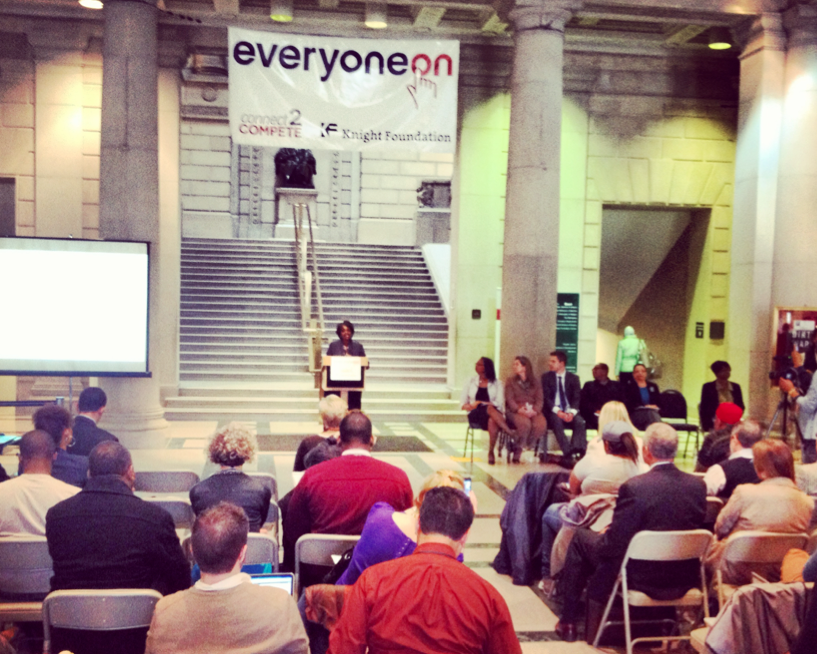The coalition of institutions involved formally in Philadelphia’s digital access conversation has grown.
As part of Philly Tech Week Presented by AT&T, EveryoneOn, a program sponsored by national nonprofit Connect2Compete, expanded its digital literacy initiative to Philadelphia, building on earlier efforts in the area by groups like KEYSPOT.
There are three big reasons that keep people offline:
- cost
- understanding the relevance to your life
- the skills to leverage access
The program will partner will internet providers like Freedom Pop, Comcast and Wilco to “connect millions of low-income citizens to programs that offer free and low-cost Internet services,” while offering discount computers to the underprivileged, and broadening access to KEYSPOT services.
Flanked by tables with flyers from a dozen digital access groups, the press conference turned public unveiling took place in the bustling lobby of the Central Parkway headquarters of the Free Library of Philadelphia, a steady stream of curious library-goers moving by.
The announcement featured FCC Commissioner Mignon Clyburn, who was the keynote speaker at a subsequent Tech Week event that evening.
“Broadband is a great enabler,” said Clyburn. “Vulnerable citizens must apply for services online. The Free Library is an important ally, but when this library closes, the need for access doesn’t close.”
Other speakers included: Knight Foundation Philadelphia Program Manager Donna Frisby Greenwood, who helped fund the expansion here as part of its ‘young Millenial’ focus, Urban Affairs Coalition Director Sharmain Matlock-Turner, Free Library President Siobahn Reardon, Desiree Peterkin-Bell, of the Mayor’s Office, among others.
“Access isn’t enough. You needs skills too,” Frisby-Greenwood said.
A KEYSPOT constituent, Sheila Anthony, spoke about how she grew her computer literacy and felt empowered by the knowledge to join a major part of the global conversation and compete for jobs and relevance in a digital age.
In the audience were city and nonprofit staff who have worked in the last three years on growing the Freedom Rings Partnership and its spinoff citywide network of computer centers, dubbed KEYSPOT.
Clyburn, a commissioner with the FCC that regulates telecommunications, spoke kindly of Comcast’s ‘groundbreaking’ Internet Essentials program, which features low-cost broadband internet and training as part of an FCC requirement following its acquisition of NBC Universal.
“The country has done a fine job without an overarching plan to get broadband in the hands of millions of Americans, but to serve and bridge the gap for those who don’t have access, where the market will not serve you because of cost or access, that’s where we need to work,” Clyburn said, with a warm, practiced smile sitting on a folding chair with Technically Philly amid light post-event chaos. She was speaking of the National Broadband Plan and expanding the Universal Service Fund, which would demand the development of broadband infrastructure like water and sewer.
The battle for fairness and equality has extended to broadband, Clyburn said, rattling off figures:
- 14-20 million Americans do not have ‘adequate’ access to broadband infrastrucutre
- 100 million don’t subscribe to broadband at home, nearly one in three.
- Just 10 percent of those living on tribal lands have broadband access
- Just 50 percent of rural and 30 third percent of those with disabilities have broadband
Basic cable is still seen as more of a necessity, she said, so a program that offers no modem rental fees, no activation fees, digital learning and cheap or free starter netbooks are vital.
As for chatter about Clyburn being shortlisted to fill outgoing FCC Commissioner Julius Genachowski, she didn’t hesitate in highlighting what her top priority is: access.
“What online engagement offers is hope and a sense of opportunity outside of what your current framework,” she said. “High-speed internet is no longer a luxury. It is a basic necessity.”
Before you go...
Please consider supporting Technical.ly to keep our independent journalism strong. Unlike most business-focused media outlets, we don’t have a paywall. Instead, we count on your personal and organizational support.
Join our growing Slack community
Join 5,000 tech professionals and entrepreneurs in our community Slack today!

Entrepreneurship is changing, and so is the economic development behind it

Tech Hubs’ new $210M funding leaves Baltimore and Philly off the table

Here’s what to know before using AI to craft your brand’s social media posts


